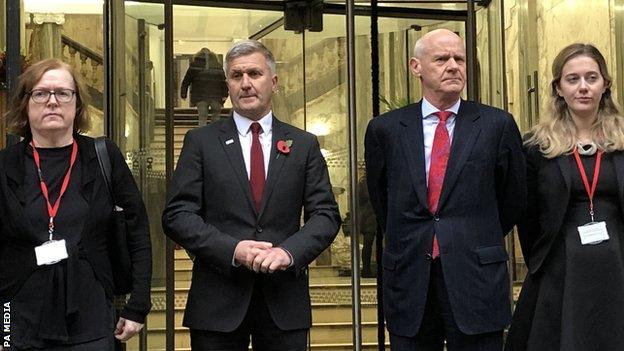Dr Richard Freeman tribunal: 'I've never doped a rider'
- Published

Mary O'Rourke (left) is defending Dr Richard Freeman (second left) at the medical tribunal in Manchester
Dr Richard Freeman insisted he has "never doped a rider" as the hearing into his fitness to practise medicine continued on Monday in Manchester.
The former British Cycling and Team Sky doctor was questioned about his interest in testosterone.
He has admitted to a number of charges but denies ordering testosterone "knowing or believing" it was for improving a rider's performance.
"I'd never consider supplementing with testosterone at any time," he said.
On Sunday, Freeman claimed he was asked by ex-medical director Dr Steve Peters, his then-boss, to treat a host of senior management and staff as well as riders, and to give them medication free of charge.
Dr Peters released a statement on Monday saying it was "simply untrue" that he "gave the green light to unregulated medicines, out of British Cycling supplies, to be given to senior management and selected staff".
The statement added: "There is no evidence of such an instruction at all."
Dr Peters said he did not instruct Freeman to treat senior management and staff members.
"All medical staff working with sports teams will treat both athletes and staff in emergencies and during any team related travel and work," Dr Peters added.
"It is very sad and disappointing that someone whom I have supported through personal troubles for many years, should now choose to cast allegations that attempt to undermine me in order presumably, to make excuses for his actions.
"Despite this, I hope Richard can soon get through this troubling time."
'I've never crossed the line'
Dr Freeman was again questioned by General Medical Council QC Simon Jackson who, it was revealed, has been supplied with riders' medical data by British Cycling.Asked about the ethical line between providing medical support to riders and doping, Dr Freeman said: "I've never crossed it. I was completely in agreement with the Wada [World Anti-Doping Agency] code."
Dr Freeman's case centres around his claim, which former British cycling technical director Shane Sutton denies, that he ordered Testogel patches to treat Sutton's erectile disfunction.
Dr Freeman has been accused of ordering testosterone to the sport's headquarters at the national velodrome in 2011, "knowing or believing" it was intended to boost an athlete's performance.
He has admitted 18 of 22 charges against him, which include ordering 30 sachets of Testogel to the National Cycling Centre in 2011, lying to try to cover up the order and lying to a UK Anti-Doping investigation.
Dr Freeman says he was bullied into ordering the testosterone by Sutton for medical reasons.
Sutton has denied those claims, claiming Freeman is lying.
When asked about his interest in testosterone levels, Dr Freeman said: "I have never doped a rider."
Jackson also questioned Dr Freeman around the use of the anti-inflammatory drug triamcinolone, which it was claimed in a parliamentary report was administered to Sir Bradley Wiggins to help him win the Tour de France in 2012.
Wiggins has previously told the BBC that he took triamcinolone for allergies and respiratory problems and sought therapeutic use exemptions (TUEs) for it to "put himself back on a level playing field".
Dr Freeman's QC, Mary O'Rourke, alleged earlier in the hearing that Sutton had doped while he was a rider, but, asked about the Australian by Jackson, the doctor said: "I didn't know about the past but Shane Sutton, when he dealt with me, was a straight shooter.
"He never suggested doping a rider. I've got my problems with Mr Sutton, and I still have my fear of Mr Sutton. Mr Sutton never asked me to dope a rider, ever."
The hearing continues.